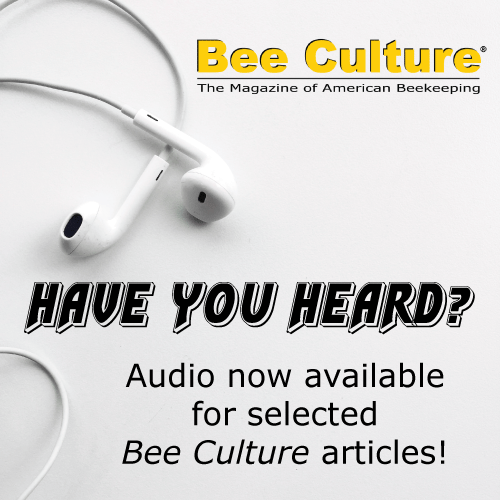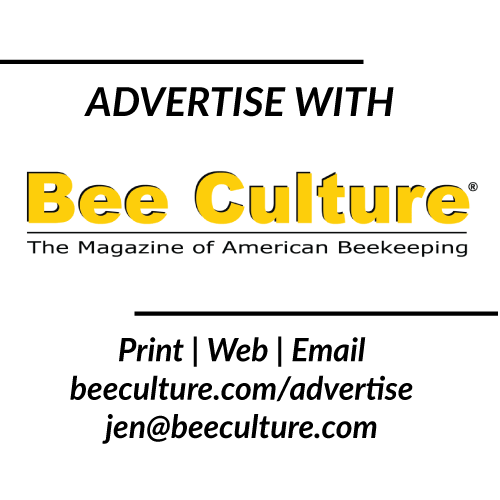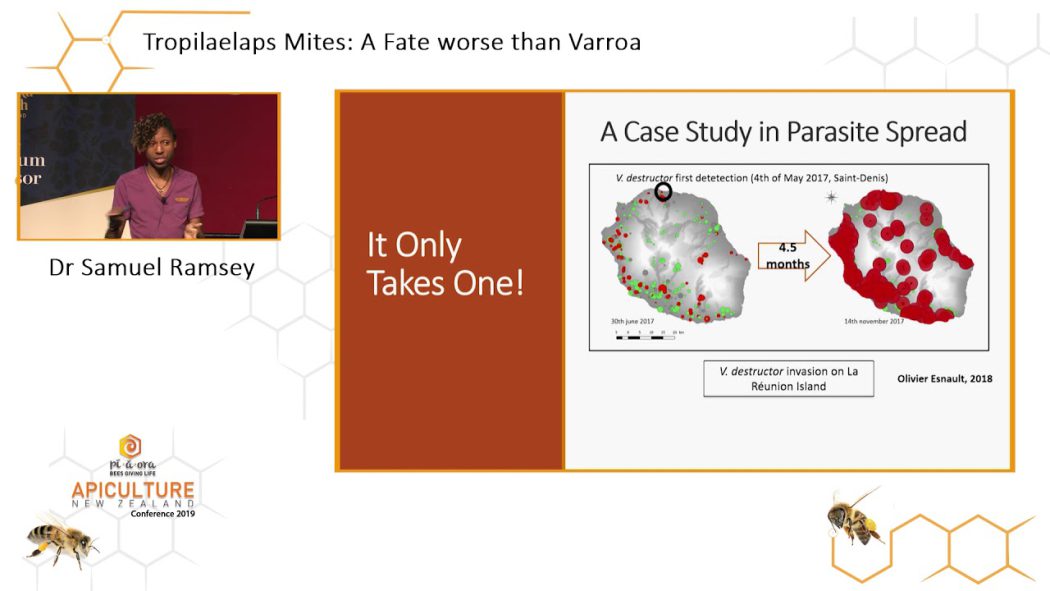By: John Miller
Other groups met concurrently during the January 2023 American Beekeeping Federation convention in Jacksonville, FL. One of those groups is the Apiary Inspectors of America. These inspectors do a lot of bee sampling in a lot of different states. During the Thursday, January 5 AIA meeting, AIA attendees and invited guests discussed and brainstormed the known and the unknown about Tropilaelaps mercedesae (Tropi).
We know a lot less than we think we do. For one thing, we don’t know what the Animal & Plant Health Inspection Service (APHIS) action plan for Tropi is. We should. Soon. It’s important – but the plan is focused on reactive action after a detection. This will be too late for North American beekeeping.
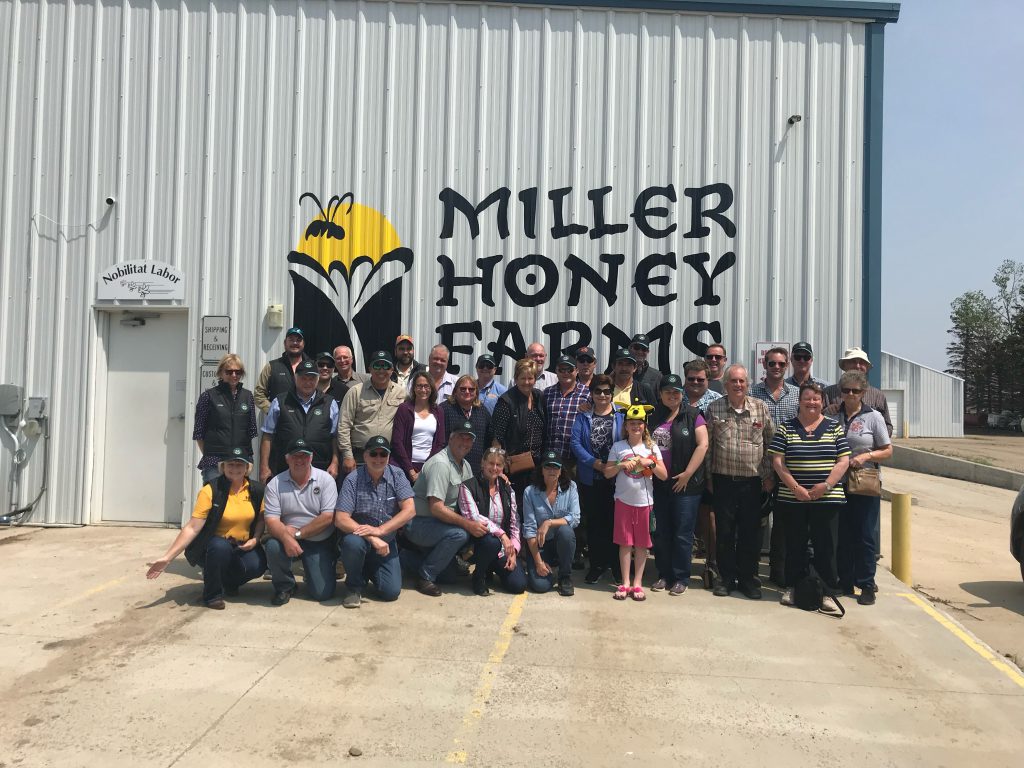
May 19, 2019 – Aussie Beekeepers in Gackle, ND
My focus is prevention. Prevent Tropi from further range expansion. Keep it in Asia.
A four-year study will soon commence in South Korea. Tropi is in Korea. Tropi requires brood rearing to continue reproduction. But wait: Korea has Winter like North America has. Brood rearing ceases – yet, Tropi persists in Korea. How?
Parasites come in a lot of flavors and colors. Most are obligate parasites. A parasite depending entirely on its’ host is called an obligate parasite. A parasite that does not depend entirely on a host is referred to as a facultative parasite. According to Jeff Pettis, PhD and President of Apimondia, who attended the meeting – it is possible Tropi may be a facultative parasite. The secondary host may be rats (and their nests). The facultative host site may be in the soft tissues of the rat mouth, eyes or in the nest, surviving on nest debris, or lice living in the nest. Maybe.
Rats are global. They like riding on ships. They come ashore in/on shipping containers. They like fresh produce, dry goods, clothing, just about anything that floats can be a home for rats. Rats don’t mind beekeeping operations either. But overall, Tropi prefers bee brood. Not just Dorsata or Meliffera brood; although Tropi does not prefer Cerana, a small comfort.
Australia is now in a fevered rush to eradicate Varroa. Varroa almost certainly arrived from Indonesia, a host country to Tropi. Australia is a big supplier of packages bees to Canadian beekeepers. Thoughtful leaders suggest now might be a time to re-open the Canadian border to American queens and packages – and close the border(s) to Australian packages. This out of an abundance of preventative caution. I don’t know a single beekeeper wishing harm to our Aussie beekeeping friends.
American beekeepers are the most mobile beekeeping industry on earth. September 25, 1987, Varroa destructor was discovered in Florida. Six years later it had infested virtually the entire nation. The need, the urgent need is to prevent history from repeating. The voice of beekeepers must be mobilized.
How could we better converse with each other? Facebook must have a zillion beekeeper pages; LinkedIn is not far behind. We all have our favored group of beekeepers with whom we share photos, snark, information, gossip and announcements. What we don’t have is a contact list for ALL INTERESTED BEEKEEPERS, or even all the clubs, or even all the state associations.
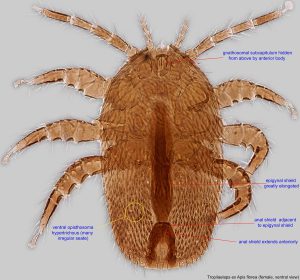 Beekeepers join local, county, state, regional and national organizations. In every organization, a faithful worker bee person keeps track of membership and contact information. Hundreds of thousands of other human worker bees attend, learn and keep bees. These beekeepers have a real live stake in contacting APHIS. Beekeepers are entitled to know what the action plan is. Beekeepers should arouse APHIS and 535 Congresspersons of this real live existential threat to our food supply. No bees = no food.
Beekeepers join local, county, state, regional and national organizations. In every organization, a faithful worker bee person keeps track of membership and contact information. Hundreds of thousands of other human worker bees attend, learn and keep bees. These beekeepers have a real live stake in contacting APHIS. Beekeepers are entitled to know what the action plan is. Beekeepers should arouse APHIS and 535 Congresspersons of this real live existential threat to our food supply. No bees = no food.
According to unconfirmed reports, when Tropi entered Pakistan, it killed every single Meliffera colony in the country. For reference, please watch Dr. Sammy Ramsey’s YouTube video: The Tropilaelaps Mite: A Fate Far Worse Than Varroa – YouTube.
The idea becomes real clear.
I’m not the guy to congregate the anti-Tropi congregation. I don’t know how.
What I can do, and am doing is nudging key stakeholders towards an activist campaign to prevent Tropi from North American shores. I have reached out to:
- California State Beekeepers Association and the 13 affiliated CA bee clubs
- California Bee Breeders Association
- The Almond Board of California
- Blue Diamond Growers
- Apiary Inspectors of America
- North Dakota Beekeepers Association
I know these groups.
I don’t know the 48 other state beekeeping organizations. I don’t know the hundreds of clubs.
I don’t know if the Federation or if American Honey Producers Association are ramping up the anti-Tropi alarms. But the readership of Bee Culture Magazine do know the hundreds of clubs, the states and are members and probably participants in whichever of the above clubs is their homey club. A lot of us are members of several clubs.
Where does lightning need to strike? Congress: via the 2023 Farm Bill. APHIS. Organizations representing insect-pollinated food for humans and livestock; Apimondia; ABF; AHPA.
Where will North American beekeeping be in five years?
For additional reading on Tropilaelaps: Download PDF



